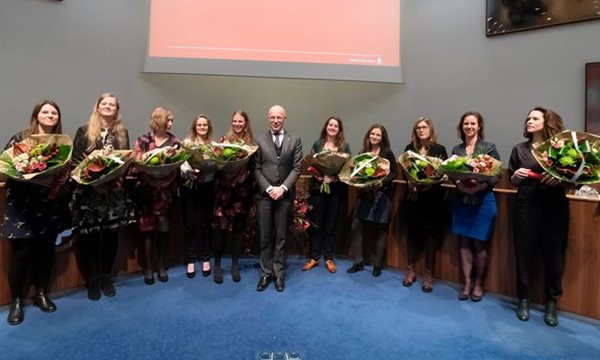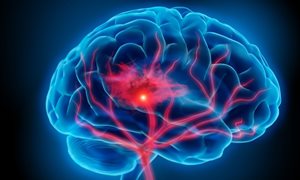14 December 2018
The goal of the stipendium is to enable junior female scientists to perform research abroad and to encourage them to pursue a scientific career in academia.
Karlien Mul from the department of Neurology, theme Disorders of movement, has been awarded the Christine Mohrmann stipendium of €5000,- in order to visit the National Institute of Health, USA.
Karlien studies Facioscapulohumeral muscular dystrophy (FSHD), an incurable hereditary muscle disease, for which at the moment various therapies are under development that will be tested for efficacy within a few years. In a rare, slowly progressive disease such as FSHD, setting up drug trials is a challenge. Karlien Mul investigates how drug research at FSHD can be set up. She uses the stipend to visit a research group at the National Institutes of Health who have experience with such research.

(Karlien Mul, second person from the right)
 The Christine Mohrmann stipendium is awarded yearly to 10 promising female PhD candidates from the different faculties of the Radboud University in Nijmegen.
The Christine Mohrmann stipendium is awarded yearly to 10 promising female PhD candidates from the different faculties of the Radboud University in Nijmegen.
The goal of the stipendium is to enable junior female scientists to perform research abroad and to encourage them to pursue a scientific career in academia.
Karlien Mul from the department of Neurology, theme Disorders of movement, has been awarded the Christine Mohrmann stipendium of €5000,- in order to visit the National Institute of Health, USA.
Karlien studies Facioscapulohumeral muscular dystrophy (FSHD), an incurable hereditary muscle disease, for which at the moment various therapies are under development that will be tested for efficacy within a few years. In a rare, slowly progressive disease such as FSHD, setting up drug trials is a challenge. Karlien Mul investigates how drug research at FSHD can be set up. She uses the stipend to visit a research group at the National Institutes of Health who have experience with such research.
(Karlien Mul, second person from the right)
-
Want to know more about these subjects? Click on the buttons below for more news.
Related news items

Aerobe exercise has a positive effect on brain function in Parkinson's disease patients
18 January 2022 Radboudumc researchers have shown that the brain function of patients with Parkinson's disease improved with regular exercise, which seems to strengthen the connections between different brain areas, while inhibiting brain shrinkage. go to page
Tiny blood vessels, big problems Radboudumc receives grant for international collaboration
3 November 2021 The Radboudumc, together with the University of Cambridge, receives a grant of €1.8M from three collaborating cardiac foundations for international research into the small blood vessels in the brain. This study will be led by Neurologist Frank-Erik de Leeuw and internist Niels Riksen. go to page
Treatment of brain diseases at risk if neuroscientists can no longer conduct their research
5 August 2021 In order to treat brain diseases such as depression, Alzheimer's or ADHD, more research into the brain is needed. go to page
Vintage video sheds new light on Parkinson’s disease New observations in unique thirty-year-old video images
14 March 2018 In the early nineteen eighties, seven young Americans developed severe and acute symptoms of Parkinson’s disease shortly after injecting themselves with a new synthetic heroine. This incident has dramatically changed the way we think about the cause and treatment of Parkinson’s disease. go to page
Back on your feet after brain damage Loop Expertise Centrum develops method for treating walking impairments
27 February 2018 Brain damage following a stroke, brain tumor or accident often results in walking impairments. The huge variation in problems and treatment options makes this a very difficult problem to treat. go to page
